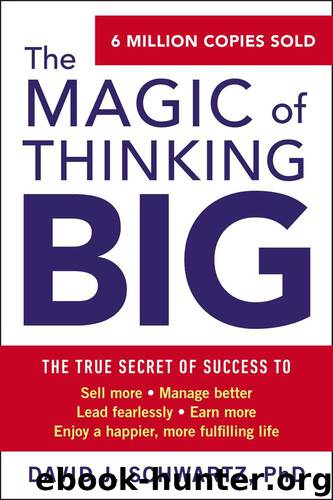The Magic of Thinking Big by Schwartz David J

Author:Schwartz, David J [Schwartz, David J]
Language: eng
Format: azw
ISBN: 9780698198586
Publisher: Penguin Group US
Published: 2014-12-01T16:00:00+00:00
MAKE IT A RULE TO SEEK ADVICE FROM PEOPLE WHO KNOW
There’s a lot of incorrect thinking that successful people are inaccessible. The plain truth is that they are not. As a rule, it’s the more successful people who are the most humble and ready to help. Since they are sincerely interested in their work and success, they are eager to see that the work lives on and that somebody capable succeeds them when they retire. It’s the “would-be-big” people who are most often the most abrupt and hard to get to know.
An executive made this clear: “I’m a busy woman, but there’s no Do Not Disturb sign on my office door. Counseling people is one of my key functions. We give standardized training of one kind or another to everybody in the company. But personal counseling, or ‘tutoring,’ as I like to call it, is available for the asking.
“I stand ready to help the fellow who comes in here with either a company or a personal problem. The fellow who displays curiosity and exhibits a real desire to know more about his job and how it relates to other jobs is the individual I like most to help.
“But,” she said, “for obvious reasons, I can’t spend time offering advice to anybody who isn’t sincere in seeking it.”
Go first class when you have questions. Seeking advice from a failure is like consulting a quack on how to cure cancer.
*
Many executives today never employ persons for key jobs without first interviewing the fellow’s wife. One sales executive explained to me, “I want to be sure the prospective salesman has his family behind him, a cooperative family that won’t object to travel, irregular hours, and other inconveniences which are part of selling, a family that will help the salesman over those inevitable rough spots.”
Executives today realize that what happens on weekends and between 6 P.M. and 9 A.M. directly affects a person’s performance from 9 A.M. to 6 P.M. The person with a constructive off-the-job life nearly always is more successful than the person who lives in a dull, dreary home situation.
Let’s look in on the traditional way two co-workers, John and Milton, spend their weekends. Let’s look, too, at the ultimate results.
John’s psychological diet on weekends is something like this: Usually, one evening is spent with some carefully selected, interesting friends. Another evening is generally spent out: perhaps at a movie, a civic or community project, or some friends’ house. John devotes Saturday morning to Boy Scout work. Saturday afternoon he does errands and chores around the house. Often he works on some special project. Currently it’s building a patio in the backyard. On Sundays John and his family do something special. One Sunday recently they climbed a mountain; another Sunday they visited a museum. Occasionally they drive into the nearby countryside, for John wants to buy some country property in the not-too-distant future.
Sunday evening is spent quietly. John usually reads a book and catches up on the news.
Wrapped up, John’s weekends are planned.
Download
This site does not store any files on its server. We only index and link to content provided by other sites. Please contact the content providers to delete copyright contents if any and email us, we'll remove relevant links or contents immediately.
| Codependency | Conflict Management |
| Dating | Divorce |
| Friendship | Interpersonal Relations |
| Love & Loss | Love & Romance |
| Marriage | Mate Seeking |
Doing It: Let's Talk About Sex... by Hannah Witton(8559)
The 5 Love Languages: The Secret to Love That Lasts by Gary Chapman(8524)
Should I Stay or Should I Go? by Ramani Durvasula(6797)
The Road Less Traveled by M. Scott Peck(6646)
The Lost Art of Listening by Michael P. Nichols(6481)
Daring Greatly by Brene Brown(5649)
We Need to Talk by Celeste Headlee(4879)
Beartown by Fredrik Backman(4431)
Men In Love by Nancy Friday(4339)
The State of Affairs by Esther Perel(3943)
The Rules Do Not Apply by Ariel Levy(3913)
How To Win Friends and Influence People by Dale Carnegie(3778)
Reflections Of A Man by Mr. Amari Soul(3707)
The Ethical Slut by Janet W. Hardy(3509)
Algedonic by r.h. Sin(3507)
Pillow Thoughts by Courtney Peppernell(3412)
Finding My Forever by Heidi McLaughlin(3311)
He's Just Not That Into You by Greg Behrendt & Liz Tuccillo(3308)
I Love You But I Don't Trust You by Mira Kirshenbaum(3234)
